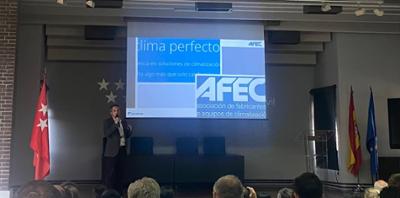

Air conditioning makes up 60% of a home’s energy bills.

Air conditioning makes up about 60% of the home’s energy consumption and rises to 75% in hotels, according to Marcos Casas who spoke on AFEC’s behalf at a conference, organised by the National Reference Centre for Building Construction and Civil Engineering, on the implementation of artificial intelligence in construction, installations and air-conditioning systems.
AFEC (Air Conditioning Manufacturers Association in Spain) took part in a conference, organised by the National Reference Centre for Building Construction and Civil Engineering, on the implementation of artificial intelligence in construction, installations and air-conditioning systems. They highlighted the importance of AI implementation to improve energy efficiency and reduce buildings’ environmental impact.
Marcos Casas was AFEC’s representative along with Daikin's management control, monitoring, remote and energy service, addressed air conditioning’s importance and high impact in our society, given that it makes up 60% of a household’s energy bills and rising to 75% in the commercial sector, particularly in the case of hotels. He also stated that air conditioning is predicted to make up 10% of energy consumption in the future. This is associated with the electrification of evaporator coils (or heat pumps), considering decarbonisation of heating systems. He revealed that, according to AFEC’s data, the air conditioning market grew by more than 20% in 2022. He went on to say that the number of connected houses will increase four-fold in 2024.
Casas went over the life cycle of an air conditioning unit: design, installation, monitoring, updating and other services. A unit’s life cycle is 15 years, at which point there is a need for equipment restoration.
Artificial Intelligence in Air-Conditioning Systems
AFEC’s representative also discussed how artificial intelligence can be applied to air conditioning units. He explained how an air conditioning's function was not only to manage a room’s temperature but also to control and improve the conditions of the interior space, which is dependent on the circulation of air in the home. Finally, he detailed the necessity to control air pressure and flow, making the control and optimisation offered by air conditioning units more complex.




